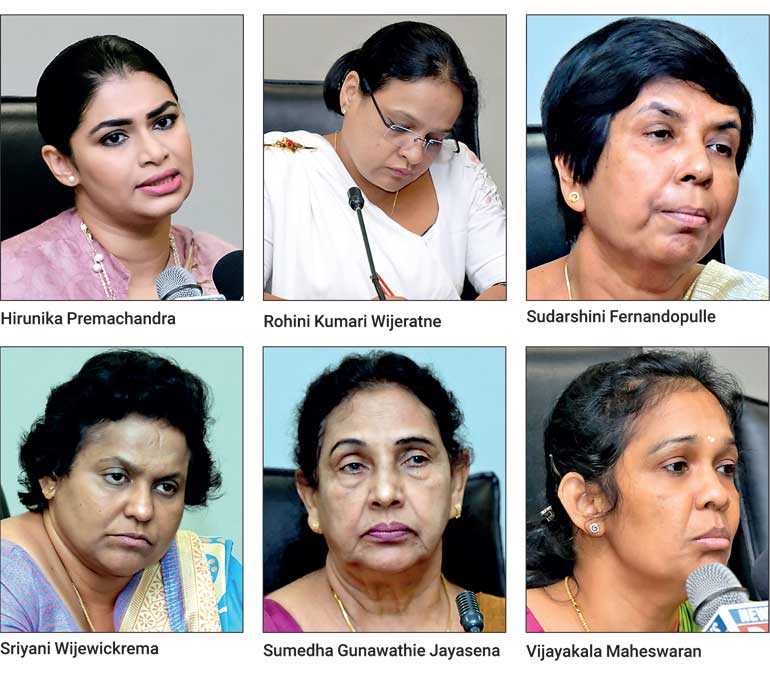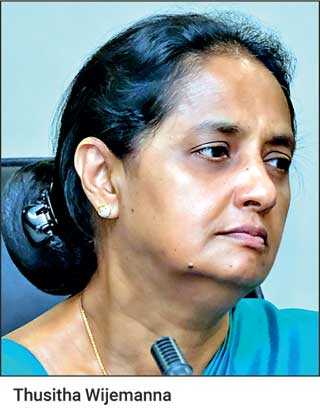Sunday Feb 22, 2026
Sunday Feb 22, 2026
Friday, 6 March 2020 00:00 - - {{hitsCtrl.values.hits}}

By Chandani Kirinde
Before she entered active politics, Dr. Sudarshini Fernandopulle did not feel being a woman would be an impediment to her career progression. She had studied at Ave Maria Convent in Negombo, an all-girls school where she was taught that girls could excel at anything if they set their minds to it. Later she was selected to the Faculty of Medicine at the University of Colombo where she worked on par with her male contemporaries and went on to have a successful medical practice without ever feeling discriminated against because of her gender. But all that changed when she entered active politicians following the assassination of her husband, former Minister Jeyaraj Fernandopulle, and entered Parliament in 2010.
“It was when I entered politics that I realised that women politicians are treated differently. We do the same work or even more than male politicians, but we don’t get the same recognition. It is a struggle to even have your voice heard in the male-dominant world of politics,” Fernandopulle said.
And she is not alone. This is the reality that the 12 female politicians in Parliament have had to face, being heavily outnumbered in the 225-member Legislature, making up just 5.3 % of all elected MPs in a country where more than 52% of registered voters are women.
Geetha Kumarasinghe was the 13th woman elected to Parliament in 2015 but was unseated after the Supreme Court disqualified her from holding a seat after she had failed to declare that she was a dual citizen at the time of her election.
Sumedha Gunawathie Jayasena was first elected to Parliament in February 1989 from the Sri Lanka Freedom Party (SLFP), being thrust into the world of active politics after her husband S.B. Jayasena was shot dead on the day he handed over his nomination papers to contest elections in the Monaragala District. It was the time when the JVP’s second insurrection was at its peak and both politicians and the public had been warned to stay clear of participating in the General Election.
“Mrs. Sirimavo Bandaranaike and many others urged me to contest the election on behalf of my husband. Let alone a woman, not even a man would have come forward to contest at the time given the fear factor present. I was a housewife and had no intention of entering politics, but I took up the challenge and contested the seat my husband had come forward to contest,” Jayasena stated.
With more than 30 years as a legislator, she is now the senior-most female parliamentarian, having successively won five General Elections from Monaragala and served as a Cabinet Minister holding important portfolios such as those of Social Services, Women's Affairs and Empowerment and Parliamentary Affairs, but she laments that the number of women entering active politics and entering Parliament has remained low.
“I have served in Governments where both the President (Chandrika Kumaratunga) and Prime Minister (Sirimavo Bandaranaike) were women but despite the strong leadership shown by women in politics in this country, the number of those who get nominations to contest elections as well as those who get elected are at a very low level,” she said.
Painfully slow progress
The fight for better representation of women in politics has been moving at snail’s pace in Sri Lanka, which often boasts of giving women the right to vote as far back as 1931 , of having elected the world’s first woman Prime Minister and a female Executive President. These milestones, which are often strung high to demonstrate that a woman has a big say in the politics of the country, cannot be further from the truth.
It was in 2016 that an amendment was introduced to the Local Authorities Election Act giving a 25% quota for women in local bodies which ensured that 2,526 women were elected in the election held in 2018. This saw a jump in women’s representation at local authorities from 2% to 29% as it made it mandatory for political parties to field a large number (17,128) of female candidates.
Rohini Kumari Wijeratne, who hails from a political family, entered Parliament for the first time in 2015 from the Matale District. She comes from a family which has engaged in politics in Sri Lanka since the 1960s but that has not made it easier for her to get a foothold in politics.
“My family members have been in Parliament from 1965 but even to get a nomination from my own party, the United National Party (UNP), in 2015 was a struggle,” she revealed.
Wijeratne says it is important for the public to understand why more female representation is vital for the country.
“There are no corruption charges against any of the women MPs. None of us went around giving alcohol, money, saris or gifts to win votes during our election campaigns but we work according to our policies and our conscience. In Parliament, we have worked as a team through the Women’s Caucus to speak on issues that concern women and children. We have spoken on child abuse, sexual harassment and domestic violence but it is difficult to be heard when the female voices are so few,” she said.
Adeline Molamure was the first woman to be elected to the Legislature, securing a seat in the First State Council from Ruwanwella in 1931. Nine decades later, the highest number of women to serve In the Legislature at any given time has been 13.
Sriyani Wijewickrema, an attorney by profession, entered Parliament from Digamadulla in 2010. Wijewickrema was a practising lawyer having taken up the fight against inequalities in society against women, when she was elected to Parliament, but she says she is not happy about the way in which women are treated in the highest elected body of the country.
“This year I completed 10 years as a Parliamentarian but the few women in the House have been unable to do a great deal to amend or bring new laws that are needed to make this country safer and more equal for women.”
She cites as an example the land laws that are discriminatory of women, the changes to which have hardly seen any progress.
“The 12 of us do not have the strength in numbers that is needed to push through such laws. It is only by us uniting as one group by cutting across political differences that we have achieved at least some progress,” Wijewickrema notes.
Thusitha Wijemanna, a medical doctor by profession, entered Parliament in 2015 from the Kegalle District and chaired the Parliamentary Sectoral Oversight Committee on Women and Gender in which she dealt with many issues that affect women and children.
“Though there were only 12 of us, we have done our best to contribute to the law-making exercise. We have discussed the issues of women’s and children’s rights and have given proposals on what changes must be introduced to laws. Unfortunately, not much of the work women legislators do gets highlighted,” she said.
Vijayakala Maheswaran first entered Parliament in 2010 and represents the Jaffna District, an area where women faced the brunt of the 30-year-long civil war.
“Women in the North and East of the country face many challenges, but they have also shown their resilience and overcome them. Unfortunately, there are few women who get the opportunity to enter politics and take up causes that are important to them at a high level,” she said.
Lacklustre regional ranking
Sri Lanka remains the country with the lowest women’s representation in Parliament in South Asia, just ahead of the Maldives. In global rankings, Sri Lanka stands at 182 among 189 nations, according to data published in the Inter-Parliamentary Union (IPU) report on Women in Politics: 2019.
Representation of women in the Cabinet has also been dismal, according to statistics provided to Parliament last month. Between 1978 and 2015, the number of women in Cabinet did not exceed four at any given time. The highest number of four was in 2000, in a Cabinet of 42.
One of the more visible and outspoken voices in the Eighth Parliament was Hirunika Premachandra, who represents the Colombo District. As a young mother, Premachandra spoke on the challenges women politicians have to face juggling home life with work.
“All women face challenges trying to strike a balance between home and work. For women politicians, it is an even more daunting task because of the manner women get judged, not only by men but also by other women. Women politicians are objectified, spoken of with sexual undertones and criticised for the way they speak or even for what they eat and drink.”
Premachandra uses the example of former President Kumaratunga, who was often vilified for choices she made in her personal life.
“President Kumaratunga was ridiculed, with people saying she drinks and associates with certain people. When Geetha Kumarasinghe entered Parliament, she was subjected to vicious attacks as she was an actress, but people forget that she was overwhelmingly elected by the people of Galle. I have often heard people say that Minister Pavithra Wanniarachchi speaks too loudly, conveniently forgetting that she is doing excellent work as a Minister.”
The lawmakers said women are often discouraged from entering politics because of the harsh manner in which they are judged and demeaned even in the media.
“Women politicians are often reminded that they have entered politics because their husbands, fathers or some male relative paved the way for them but the same question is not asked of the male MPs, most of whom are also in politics because they come from political families and have requisite connections. If women are to enter politics in large numbers, the conditions must be conducive for them to come forward,” Wijewickrema said.
The common appeal of all female legislators is for political parties to give more nominations to women and for voters to ensure that at least one woman from each district enters Parliament.
“Each voter is entitled to three preferential votes so please ensure you give one of the preferences to a woman so that in the next Parliament there can be a greater voice for all the women of this country,” said Jayasena.